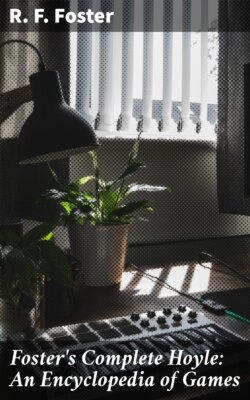Читать книгу Foster's Complete Hoyle: An Encyclopedia of Games - R. F. Foster - Страница 36
На сайте Литреса книга снята с продажи.
ETIQUETTE OF AUCTION.
ОглавлениеIn the game of Auction slight intimations convey much information. The code succinctly states laws which fix penalties for an offence. To offend against etiquette is far more serious than to offend against a law; for in the latter case the offender is subject to the prescribed penalties; in the former his adversaries are without redress.
1. Declarations should be made in a simple manner, thus: “one heart,” “one no trump,” “pass,” “double”; they should be made orally and not by gesture.
2. Aside from his legitimate declaration, a player should not show by word or gesture the nature of his hand, or his pleasure or displeasure at a play, bid, or double.
3. If a player demand that the cards be placed, he should do so for his own information and not to call his partner’s attention to any card or play.
4. An opponent of the declarer should not lead until the preceding trick has been turned and quitted; nor, after having led a winning card, should he draw another from his hand before his partner has played to the current trick.
5. A card should not be played with such emphasis as to draw attention to it, nor should a player detach one card from his hand and subsequently play another.
6. A player should not purposely incur a penalty because he is willing to pay it, nor should he make a second revoke to conceal a first.
7. Conversation during the play should be avoided, as it may annoy players at the table or at other tables in the room.
8. The dummy should not leave his seat to watch his partner play. He should not call attention to the score nor to any card or cards that he or the other players hold.
9. If a player say, “I have the rest,” or any words indicating that the remaining tricks, or any number thereof, are his, and one or both of the other players expose his or their cards, or request him to play out the hand, he should not allow any information so obtained to influence his play.
10. If a player concede, in error, one or more tricks, the concession should stand.
11. A player having been cut out of one table should not seek admission in another unless willing to cut for the privilege of entry.
12. A player should not look at any of his cards until the end of the deal.
